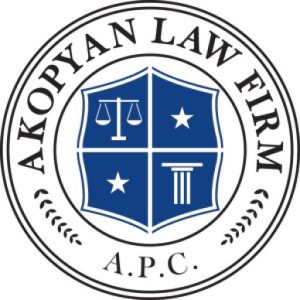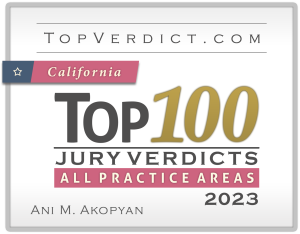Highland Park Employment Lawyers
The Akopyan Law Firm A.P.C. is committed to fighting for the rights of workers in Highland Park who may encounter discrimination, harassment, retaliation, wrongful termination, or other unlawful conduct in the workplace. Additionally, our firm is well-prepared to offer small businesses in Highland Park cost-effective and practical solutions for employment law issues. With extensive experience in handling employment disputes from both the employee and employer perspectives, our team possesses valuable insights into the mindset of the opposing party. This unique perspective significantly contributes to achieving the best possible outcomes for our clients. If you are facing employment-related challenges in Highland Park, whether you are an employee seeking justice or a small business owner seeking effective employment law solutions, the Akopyan Law Firm A.P.C. is here to assist you. We are dedicated to providing exceptional legal representation and guidance to help you navigate these issues successfully. Please reach out to us, and we will be pleased to evaluate your case and discuss how we can assist you.
About Highland Park, California
 Highland Park is a neighborhood in Los Angeles which is home to more than 60,000 residents. It covers approximately three square miles and encompasses the following zip codes: 90041 and 90042. Highland Park has a rich history and has undergone significant changes over the years:
Highland Park is a neighborhood in Los Angeles which is home to more than 60,000 residents. It covers approximately three square miles and encompasses the following zip codes: 90041 and 90042. Highland Park has a rich history and has undergone significant changes over the years:
Indigenous Inhabitants: Before European settlers arrived, the Highland Park area was inhabited by the Tongva people, who had a deep connection to the land and its natural resources.
Spanish and Mexican Periods: With the arrival of Spanish explorers in the late 18th century, the land became part of the Spanish mission system. In the Mexican era, after gaining independence from Spain, the area was part of Mexican land grants. The Rancho San Rafael encompassed the region that includes Highland Park.
American Settlement: Following the Mexican-American War and the Treaty of Guadalupe Hidalgo, California became part of the United States. In the 19th century, American settlers began to establish farms and ranches in the Highland Park area.
Railroad and Development: Highland Park’s history is closely tied to the expansion of transportation networks. In the late 19th century, the completion of the Southern Pacific Railroad through the area facilitated transportation and brought growth. Highland Park became a desirable location for suburban development.
Annexation into Los Angeles: In 1895, Highland Park was annexed into the city of Los Angeles, contributing to the city’s overall expansion. This paved the way for increased development and urbanization.
20th Century Boom: Highland Park experienced a significant boom in the early 20th century. The construction of the Arroyo Seco Parkway (now part of the 110 Freeway) in the 1940s made it easier for residents to access downtown Los Angeles and contributed to the growth of the neighborhood.
Cultural and Economic Hub: Highland Park developed a diverse and vibrant community, becoming a cultural and economic hub in Los Angeles. It was known for its historic architecture, including Craftsman-style homes and Art Deco buildings.
Decline and Revitalization: Like many urban neighborhoods, Highland Park faced economic challenges and periods of decline in the mid-20th century. However, in recent decades, it has experienced a revival and gentrification, with young professionals and artists moving into the area.
Community and Arts: Highland Park has a strong sense of community, with local businesses, art galleries, and cultural events contributing to its unique character. It has also been a center for the arts, attracting musicians, artists, and creatives.
Today, Highland Park is a diverse and vibrant neighborhood known for its historic architecture, cultural diversity, and thriving arts scene. It has become a desirable place to live for its proximity to downtown Los Angeles, its unique character, and its sense of community. The neighborhood continues to evolve while preserving elements of its historical charm.
The Akopyan Law Firm A.P.C. is headquartered in Los Angeles which is just a few miles away from Highland Park. Thus, our lawyers stand ready to serve employees and employers in Highland Park with all their employment law needs.
The Best Employment Attorneys For Highland Park Residents
Finding the right labor lawyer in Highland Park can indeed be challenging due to the variety of firms and their differing approaches. It’s important to understand that not every employment attorney will be suited for every case. Some lawyers may prioritize quick, low-value settlements, while others are willing to engage in more protracted legal battles to secure a full-value resolution. When conducting an online search for “Highland Park employment lawyer” or “wrongful termination attorney in Highland Park,” you may come across numerous advertisements from lawyers who are eager to take the easier route. At the Akopyan Law Firm, our Highland Park, California labor lawyers are committed to achieving the best possible outcome for each client, regardless of the complexity of the case or the effort required. Our dedication to delivering high-quality legal services means that we limit our practice to a certain number of cases, ensuring that each client receives personalized attention and is treated like family. We are proud of the exceptional personal service we offer, and we invite you to read what our clients have to say about their experiences with us. Our relationships with clients often extend beyond the duration of their cases, and our Highland Park employment lawyers fight passionately for our clients, as reflected in the excellent results we have achieved. If you are in search of employment lawyers in Highland Park, please don’t hesitate to contact us for a complimentary case evaluation. We are here to assist you with your employment law needs and are dedicated to advocating vigorously on your behalf.
We Can Help Highland Park Residents With All Sorts of Employment Disputes, Including Those Which Involve:
Featured Articles:
When Major Pay, Hours, or Job Duty Changes May Be Treated as Constructive Discharge in California
📌 Key Takeaways Significant negative changes to pay, hours, schedule, or job duties—especially after an employer learns of a worker’s disability or qualifying medical condition, medical restrictions, or a request for reasonable accommodation—may support a constructive discharge analysis under California employment law, depending on the facts. A resignation may be treated as involuntary if an employer creates or allows working conditions that become objectively and subjectively intolerable, and the worker resigns because of those conditions. Sudden loss of overtime, deep hour cuts, or reassignment to a lower-paying position after medical disclosure or an accommodation request may be relevant to whether an employer applied financial pressure tied to protected status or protected activity. Schedule changes—such as rotating graveyard shifts, split shifts, or constantly changing start times—can matter when they interfere with treatment and recovery and begin after the employer receives medical restrictions or an accommodation request. Assigning duties that conflict with known medical restrictions may raise issues under disability-discrimination and reasonable-accommodation principles, including whether the employer engaged in the interactive process in good faith. Documentation often matters, including pay records, time sheets, job descriptions, written medical restrictions, and communications about scheduling, duties, and complaints. ~ ~ ~ ~ ~ ~ ~ ~ ~ ~ ~ ~ ~ ~ ~ ~ ~ ~ In California, resignation is not always treated as purely voluntary. In some situations, significant negative changes to pay, hours, scheduling, or job duties may be analyzed under the doctrine of constructive discharge. In general terms, constructive discharge is... Read more
Constructive Discharge and Retaliation: What “Pressure to Quit” May Look Like in California Workplaces
📌 Key Takeaways Pressure to resign can sometimes align with legal concepts such as constructive discharge or retaliation, particularly when workplace conditions deteriorate after a worker engages in protected activity (like complaining about discrimination, harassment, wage issues, or safety concerns) or requests help related to a disability or qualifying medical condition. Pressure without a formal termination may show up as reduced shifts, heightened scrutiny, or constant criticism that gradually makes continued employment feel untenable. Discipline that follows protected activity—such as sudden write-ups, performance improvement plans, reduced hours, or loss of preferred routes after a complaint—may raise questions about retaliatory motivation. Punitive work assignments—such as being assigned to the hottest area, the dirtiest tasks, or constant heavy lifting soon after a complaint—may be cited as part of a pattern intended to push a worker out. Pressure tied to disability or a medical condition may include silence after a reasonable accommodation request, delayed responses, or scheduling/assignment changes that conflict with documented restrictions. Hostility and selective enforcement—including exclusion, targeted jokes, public criticism, or rule enforcement applied only to the worker who complained—may strengthen concerns that the conduct is not ordinary supervision. These patterns do not automatically mean the law was violated. They can, however, be meaningful “sequence and timing” facts that an employment lawyer may evaluate in context. ~ ~ ~ ~ ~ ~ ~ ~ ~ ~ ~ ~ ~ ~ ~ ~ ~ ~ In many workplaces, an employer does not announce a termination. Instead, an employer may change schedules,... Read more









Millions of Dollars Recovered For Our Clients
Check Out Our Case Results




